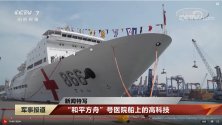I am hoping the 076 is essentially an unmanned 075, that has unmanned amphibious vehicles as well as unmanned aircraft. They might even be assigned to the first assault wave, supported and followed up by the 075’s.I highly doubt that the 4 Japanese flat-decks can be called LHDs. 2 of them are proper aircraft carriers (Izumo), and the other 2 are helicopter carriers (Hyuga) with potential to undergo similar conversion as the Izumos.
However, the PLA should just consider all 6 of them as proper light aircraft carriers.
Indeed. Although, compared to the United States, China does have a home-front advantage where the PLAN can reliably depend upon the PLAAF, PLARF and some elements of the PLAGF to share portions of the burden.
In that regard, for the closest timeline, the PLAN should build and expand her fleets that would achieve parity with the expected deployable naval forces of the US and her allies (Japan, South Korea, Australia, UK, France, Canada) in the Western Pacific in order to guarantee both numerical and qualitative edge for the PLAN. No need to outbuild the USN just for the sake of outbuilding the USN.
That's true.
However, what really does matter is how the PLAN views their 075s and 076s.
This is because -
The 075s are functioning as:
Type: LHD
Role: Launching, commanding and supporting amphibious assault operations; ASW
Meanwhile, the 076s would function as:
Type: Mixture of LHD and small CATOBAR CV
Role: Launching, commanding and supporting amphibious assault operations; ASW; and most importantly, UCAV carriers
Therefore, it is still an open question on how the PLAN would eventually distribute and assign roles to their non-CV flat-deck warships. In my opinion, the 075s are more geared towards amphibious warfare, and the 076s are more geared towards providing UCAV squadrons to the main fleet CVs (i.e. 001, 002, 003 etc) on the high seas.
Speaking of which, according to pop3 (Haven't heard from him for quite a long time, anyone knows how he's doing right now?), the 2nd phase of amphibious assault ship construction in China has already begun, with orders for 5 ships of the 2nd batch 075s being placed. This would bring the number of 075s to 8 ships in total.
Simultaneously, pop3 also claimed that the 076s are expected to begin construction work within the 2nd phase of amphibious assault ship construction too. However, it is unclear whether the 076s would begin construction simultaneously as the first 075 of the 2nd batch, or sometime afterwards. The possibility of features meant for the 076s are included in the 2nd batch 075s should not be discounted as well.
You are using an out of date browser. It may not display this or other websites correctly.
You should upgrade or use an alternative browser.
You should upgrade or use an alternative browser.
PLA Navy news, pics and videos
- Thread starter Jeff Head
- Start date
Rather than matching their F35s with similar, wouldn’t it be better to negate their advantages?If weapons are only for winning physical wars, than a lot of these carriers around the world won't even need to be commissioned.
Weapons are are also for psychological warfare, propaganda and cultural competition. Korean and Japan are low-cost/low-tier "enemies" to China. They to China are like Ukraine and the Baltic states to Russia: they weren't meant to and will never be decisively stronger than China, but their existence forces China to waste some military expenditure and resources on weapon systems and capabilities that are not strategically effective/meaningful on the US. This is because real wars are NOT likely to happen between them and China, but a lot of peace time arm wrestling and conflict-less skirmishes are bound to happen. Basically, they are strategic diversion that weakens China's ability to concentrate resources on countering the USA. If China's strategic goal is peaceful rise, it must develop an effective peacetime capability to use show-of-force to stare her opponents down.
Therefore, if a tiny little investment can win you significant gripping point (or even superficial advantage) against them, it would be very much beneficial and worth the cost. Without the STOBAR F-35, the Japanese and Koreans will be a lot more encouraged to sail their ships in a "show-of-force" manner to provoke China. This will NOT be meant to start a real skirmish or hot conflict with China (because these ships don't really have the fighting capability against China's full military might), but politically and propaganda-wise, this will give the Western propaganda machine a chance to propel a false rhetoric that the Chinese military is weak against even second tier opponents like Japan and Korea. This would rouse those dissident-minded groups and people like the HK rioter to create problem in China. And because it is only a show of force, China can NOT really counter effectively without actually going to war and prove her strength by destroying those ships. Therefore this become a propaganda war in which China will be at the losing side, because both the patriotic Chinese audience at home to curse the government for being weak and ineffective, and it will encourage and boost the confidence of China's opponents (separatists, anti-China foreign audience).
In case of Taiwan, if both Japan and Korea has F-35 on their heli-carriers and China don't have J-35 on CV16/17, this will also give the propaganda machine in Taiwan a chance to propel false rhetoric that their supposed "allies" (Japan and Korea) can somehow be capable of giving them meaningful help with MINIMAL COST (meaning: without even having to get the US military directive involved). This might not change the real strategic balance, but it would significantly increase The cost China will need to "win against the enemy without a fight" (不战而屈人之兵).
Real strategy and geopolitics are all about costs and benefit.
For example, what is the point of an F35 if it can be tracked and electronically suppressed?
The same psychological effect on your in Taiwan, as you described, can be achieved if someone like the Saudis, Egyptians, Algerians, Serbs, Belarusians, with their potential new systems, demonstrate some of these abilities on F35’s in their regions.
If an F35 is shot down using radar and IR guidance in a conflict zone in Europe or the Middle East, or even the Korean Peninsula, then the psychological effect in Taiwan will be enormous.
Edit: The same affect can be had by making a drone with slightly better speed, range, and maneuverability than the F35, and just tailing them, on their 6, for very long periods of time.
Last edited:
Not sure that's the analogy you're looking for given Russia's terrible performance lolThey to China are like Ukraine and the Baltic states to Russia: they weren't meant to and will never be decisively stronger than China
No, because Japan is NOT a real opponent. The chances of PLA going to war with ONLY the Japanese is slim to none, any real war with Japan involved will be mainly fought with the US. Wasting resources on developing new equipment just to counter the Japanese is counter-productive and a waste of resources. Because like what @Temstar has previously mentioned, Strategic Rocket Force already has the gadgets to deal decisively with (ONLY) Japan.Rather than matching their F35s with similar, wouldn’t it be better to negate their advantages?
No, that's not my point. F35 itself is NOT the trump card in this card game here. If F35 really is a trump card against China, all the US need to do is to sell Taiwan F35. And that's NOT happening in any foreseeable future unless the next general US fighter are ready to be commissioned en masse.For example, what is the point of an F35 if it can be tracked and electronically suppressed?
The same psychological effect on your in Taiwan, as you described, can be achieved if someone like the Saudis, Egyptians, Algerians, Serbs, Belarusians, with their potential new systems, demonstrate some of these abilities on F35’s in their regions.
If an F35 is shot down using radar and IR guidance in a conflict zone in Europe or the Middle East, or even the Korean Peninsula, then the psychological effect in Taiwan will be enormous.
Edit: The same affect can be had by making a drone with slightly better speed, range, and maneuverability than the F35, and just tailing them, on their 6, for very long periods of time.
The foundation of the psych/propaganda war is this:
- The battle field is the public perception of different populations in the region, NOT the academic consensus of professional military analyst, government advisors and the intel community with high security clarence.
- Real technicality of military hardware is NOT entirely relevant, NOR is it entirely irrelevant. Truth doesn't matter, public perceptions matters more than truth.
The premise of this psych war is this:
1. The US will make sure that F35 keeps its prestige and mysteriousness by preventing Taiwan from getting it. This creates a hierarchy like: US (owns F22 and F35) >> Japan/Korea (owns only F35) >> Taiwan (owns nothing). In this sense, the US will be able to maximize the propaganda effect of the F-35, so much so as to make it a tool of strategic deterrence FOR THE GENERAL PUBLIC.
2. The US will push Japan/Korea to be the front runners provocateurs in which they will NOT have the real decisive military capability to defeat China in a real war. Instead they will invest in eye-catching hardware that can garner enough media publicity for the purpose of deterrence, again, FOR THE GENERAL PUBLIC. (Examples include the proposed Korean 45,000 class STOVL carrier, Japan's 20,000ton class heavy destroyer/cruiser, the Izumo, etc. These hardware are waste of money for Korea and Japan, because they bring no real advantage to the table in the perceived conflict they are supposed to be used, namely, against China). But these will be important, because:
i. They've calculated and concluded that the chances of them (Korea/Japan) going to real war with China (without the US) is slim to none, because they pose no real threat to China, and thus the diplomatic and geostrategic cost for China to attack them far out-weights any benefit China can gain from starting such war. Thus, these equipment will be perfectly safe to conduct superficial media/propaganda oriented micro-aggression missions of provoking China, to solicit from China either an over-reacted response, which they can paint as evidence for "aggressive China", or an under-reacted response, in which they can paint as evidence for a "weakling China". This is a lose-lose situation for China, because both of these will increase the geopolitical cost for China to further develop its own international trade system, which is what China need to sustain and safeguard its "Peaceful Rise".
ii. They have calculated and concluded that strategically speaking, the threat the Chinese military and MIC poses towards the US hegemony can only be mitigated in two ways: one is to prevent China from further developing and strengthening itself (covered in point i), the other is to divert China's resources from focusing on aiming at offsetting the core strategic advantage of the US. Militarily, this means that the more resources the PLA and Chinese MIC has to allocate for threats types other than the core US capabilities, the more comparative advantage the US can retain over China. In this aspect, the more similar the Korea/Japanese capabilities are to the US, the more cost-effective the PLA and Chinese MIC can develop counter-capability for.
Therefore in this chess game, if the PLA focuses more on mitigating threat of point i, it will fall victim to US desires in point ii. if PLA focuses more on mitigating threat of point ii, it will fall victim to the risk in point i.
3. The US has calculated that when no real strategic threat is presented to China, China will be reluctant to act aggressively and desperately towards militarily hapless micro-aggressions, especially by not-first-tier-powerful nations like Japan and Korea. This is because when no real strategic threat is perceived by China, China will focus more on development, and the current stage and near future stage of China's development is one that needs peaceful environment in which China needs to present a "Capable but Peaceful" hard power, in order to gain co-operation globally (especially from the Global South). Therefore the best US grand strategy is a) not giving China a reason to go full-out survivor mode, b) tarnish China's image by making it either "Capable but not Peaceful", or "Peaceful only because not Capable enough yet"; all the while making US the solution to any so-called "China Problem" to the world.
THEREFORE, I think the best and more cost effective counter against current Japanese and Korean procurement of capital hardware, is to develop the CATOBAR J-35 into having STOBAR capabilities, and put them on Liaoning and Shandong. This will give the PLAN plenty of counter-propaganda materials, at the lowest cost. It will also allow the PLAN to do pay-back moves (by sailing close to their shore with a battle group), if Korean and Japanese ships with their F-35 dares to do provocation sails near places deemed strategically sensitive to China (like disputed areas in SEA, Taiwan Straight, or others).
Last edited:
Russia's terrible performance is due to Russia's own bad choices. Not because the situations Russia faces itself is one which there are no good enough alternatives for.Not sure that's the analogy you're looking for given Russia's terrible performance lol
In fact, in my opinion, had the Russians decision makers been less snobbish, less racist, and less full-of-shit, they would have long welcomed China with open heart, which would have given them a lot more business opportunities to grow faster, as well as having a much stronger military and be in a much stronger negotiation position against the West.
Imagine if Russia was exporting oil and gas to China as much as they were to China for a long time, the leverage they would have would have been great.
Imagine if they Russians has been proactively sort out co-operations with China on military hardware and technology, they leverage they have against the US would have been much greater. It would also make it harder for China to go its own way on MIC standards. It would also have made China a much bigger threat to the US much earlier, and thus alleviate NATO's focus on Russia.
I can list out a lot more problems with Russian strategic decisions. But this is the wrong thread for it, and I have already gone quite off-topic. So it will stop here.
Alternatively:
1. keep the existing J-15s on the existing STOBAR carriers, but operate these carriers in conjunction with CATOBAR carriers with a higher mix of J-35?
2. Or build a few more Type-076 which have a catapult and presumably some level of J-35 capability? Then operate them in conjunction with the STOBAR carriers
1. keep the existing J-15s on the existing STOBAR carriers, but operate these carriers in conjunction with CATOBAR carriers with a higher mix of J-35?
2. Or build a few more Type-076 which have a catapult and presumably some level of J-35 capability? Then operate them in conjunction with the STOBAR carriers
asif iqbal
Banned Idiot
We have to remember that US relies heavily on interoperability of its allied nations
China has to field against JMSDF, South Korea, RAN and India
plus other smaller nations like Philippines are also In the US camp
USN can field 6-7 Carriers in the Pacific now because Royal Navy has 2 Carriers for Arctic and Mediterranean
JMSDF has
2 x Izumi
2 x Hyuga
3 x Osumi
8-10 AEGIS/BMD DDG
RAN
2 x LHD
3 x AEGIS
South Korea
2 x LHD
+1 Carrier soon
6 x AEGIS/BMD
and maybe we leave India out of it as it cant even handle Pakistan yet
China should aim for
6 x ARG + 6 x CSG
but in reality 8 x ARG and 8 x CSG of which are 6 x CVN with full strength of 48 x J35 each
China has to field against JMSDF, South Korea, RAN and India
plus other smaller nations like Philippines are also In the US camp
USN can field 6-7 Carriers in the Pacific now because Royal Navy has 2 Carriers for Arctic and Mediterranean
JMSDF has
2 x Izumi
2 x Hyuga
3 x Osumi
8-10 AEGIS/BMD DDG
RAN
2 x LHD
3 x AEGIS
South Korea
2 x LHD
+1 Carrier soon
6 x AEGIS/BMD
and maybe we leave India out of it as it cant even handle Pakistan yet
China should aim for
6 x ARG + 6 x CSG
but in reality 8 x ARG and 8 x CSG of which are 6 x CVN with full strength of 48 x J35 each
antiterror13
Brigadier
really? any links?It was sent at Indonesia’s request.
It was in this post..really? any links?
Post in thread 'PLAN breaking news, pics, & videos'
PLAN breaking news, pics, & videos
Ark Peace arrived in Indonesia:
View attachment 101647View attachment 101648View attachment 101649View attachment 101650
More...CGTN report on Peace Ark carrying out medical operations while in Indonesia:
The Chinese naval hospital ship "Peace Ark" has arrived in Indonesia on a humanitarian mission to provide free medical services to local people. Our reporter Huang Yue has the story.
The Peace Ark sets sail again!
Upon arriving in Jakarta, medical workers set up tents in the harbor and started treating patients.
"My mother has a heart disease, so I brought her here. She has been under treatment for a long time, but we haven't seen any progress. My friend told me a Chinese hospital ship would come, so we came here for treatment. I heard that a Chinese hospital ship came in 2013 and treated a lot of people. I hope they can help my mom."
"I'm Mrs. Eunice, and I'm 60 years old. My family drove 100 kilometers from our home yesterday to attend the welcome ceremony. The medical team told me they started work today, so I came to the cardiology department. I'm grateful to them for helping us."
This is Mission Harmony-2022 – Peace Ark's 10th humanitarian mission since 2008.
At the invitation of the Indonesian military, the hospital ship will stay in Indonesia for seven days.
Over 100 Chinese medical workers are onboard, with 14 clinical departments and a pharmacy, as well as a helicopter for emergency medical use.
The Chinese Navy earlier said surgical treatment and hospitalization will also be offered if necessary.
Over 700 local residents came to see the doctors on the first day.
Local people say they are impressed by the professional and thoughtful services.
DESY Volunteer in Jakarta "I've never been to China. I got all information about China from social media before today. But this time, I saw first hand what Chinese people and China's medical services are like."
The Peace Ark has sailed 240,000 miles over the past 14 years, serving more than 230,000 people in over 40 countries and regions. Huang Yue, CGTN.




As a personal reply to Goldstein's tweet:

